
Published at 22nd Feb 2021
Modified at 12th Nov 2024
Opal Patterns - The Ultimate Guide
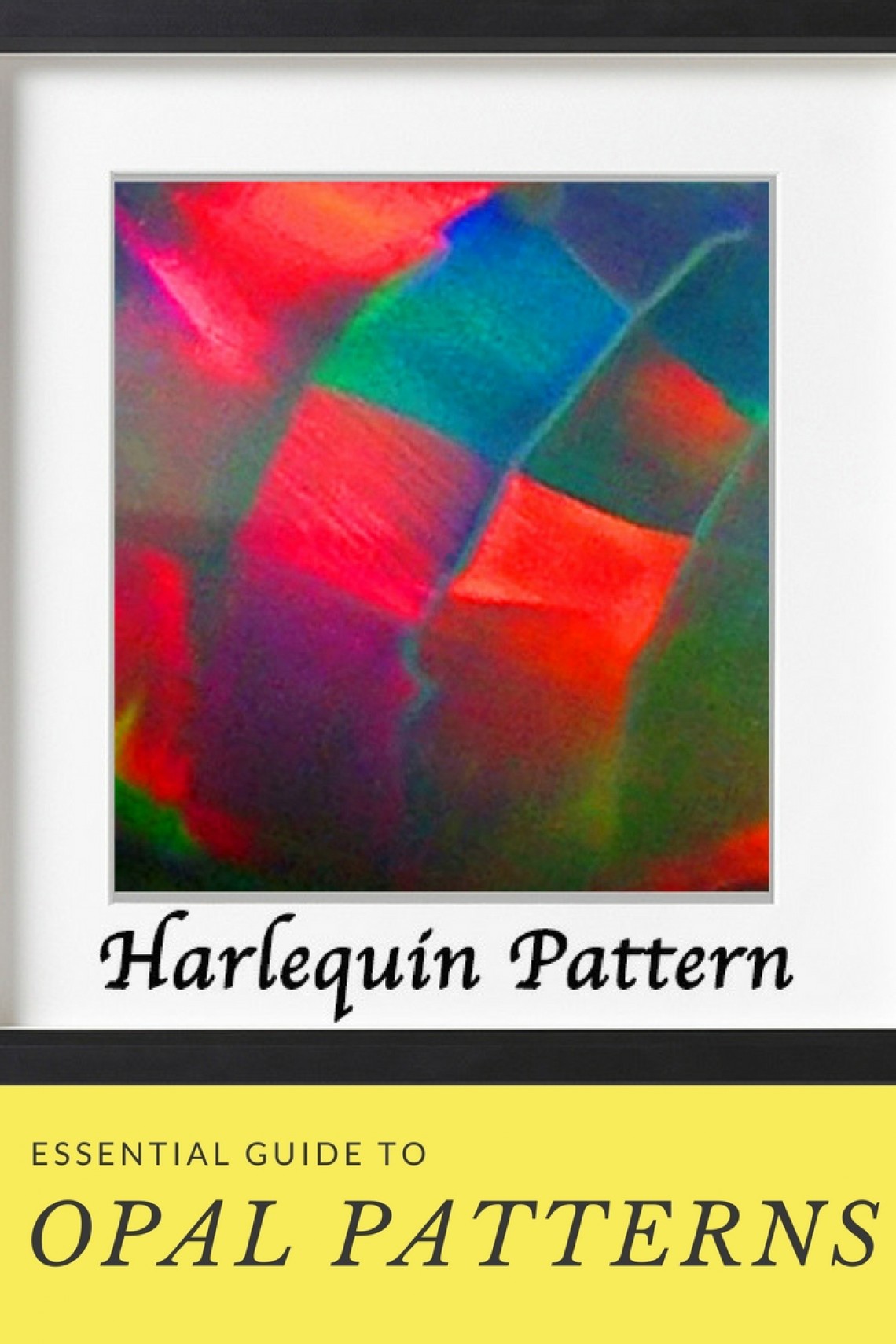 The Opal is considered the Queen of all gemstones, and some
say it’s the King of all gemstones too. What makes opals so unique in the gemstone world is that it
is rare to find quality opals with the same exact color and with incredible patterns
like opal. There is scientific research on how these patterns are
formed but the Opal is so complicated that no one has figured it out yet. I’m sure our readers would prefer to read about beautiful
patterns that are formed in opals and we can touch on how these patterns are
formed later.
The Opal is considered the Queen of all gemstones, and some
say it’s the King of all gemstones too. What makes opals so unique in the gemstone world is that it
is rare to find quality opals with the same exact color and with incredible patterns
like opal. There is scientific research on how these patterns are
formed but the Opal is so complicated that no one has figured it out yet. I’m sure our readers would prefer to read about beautiful
patterns that are formed in opals and we can touch on how these patterns are
formed later.
By far the most prized and rare pattern is the true Harlequin opal. This pattern is extremely rare and we use the terminology of true pattern, as some opals might just have one or two shapes like harlequin pattern but only in a small area.
How Rare is Harlequin Pattern Opal?
Most opal miners at Lightning Ridge will never mine or dig out a Harlequin pattern opal in their life! Red on black is the rarest and most expensive color so when these colors are combined with the Harlequin pattern it is a truly amazing stone.
Opal miners at Lightning Ridge must shift over a tonne of dirt on average to find one single Opal. To find a Harlequin pattern Opal, thousands of tonnes of dirt need to moved.
To date we have never seen a Boulder Opal that has a a true Harlequin pattern.
Only a few Ethiopian opals have had a true Harlequin pattern.
What is a harlequin pattern opal?
This unique opal has contracting elongated squares or diamond shapes that repeat in the pattern. It is very rare to find in nature.
Classes of harlequin patterns include
- Peacock Harlequin
- Hexagonal Harlequin
- Flagstone Harlequin
- Checkerboard Harlequin
List Of Opal Patterns With Pictures
With other opal patterns there is more flexibility when it comes to definition. Some opals may have two or more patterns or colors ,so there are no exact wording for opals with combination of patterns .
Some names can be very Creative when the owner falls in love with their opal. We have included the following images as good examples of each pattern in alphabetical order
Bamboo Leaf Pattern
Bright Veins of color like bamboo shoots that can be formed naturally in potch or full opal

Block Pattern
Large patterns form square, rectangular or freeform shapes that cover majority of the opal

Broad flash
This pattern has large flashes of color that are predominant in the opal

Cats eye
Rolling cats eye pattern is rare, as the opal must have a high cabochon shape. The flash of color will form a thin line scross the Opal when it is rotated

Cathedral Pattern
Rare pattern in Boulder opal and mostly formed by wood or vegetation matter

Chaff Pattern
These are lines that look like straw storks as chaff lines in different directions

Chinese Writing
As the name suggests these opals have what looks like Chinese writing and are in natural formations

Dragon Skin
This description is used with Ethiopian and Boulder opals with pattern like snake skin.

Floral Pattern
Described with flowing patterns like flowers and is mostly multiple colors like a flower patch

Fern Pattern
Formation like plant ferns with prongs from central stork
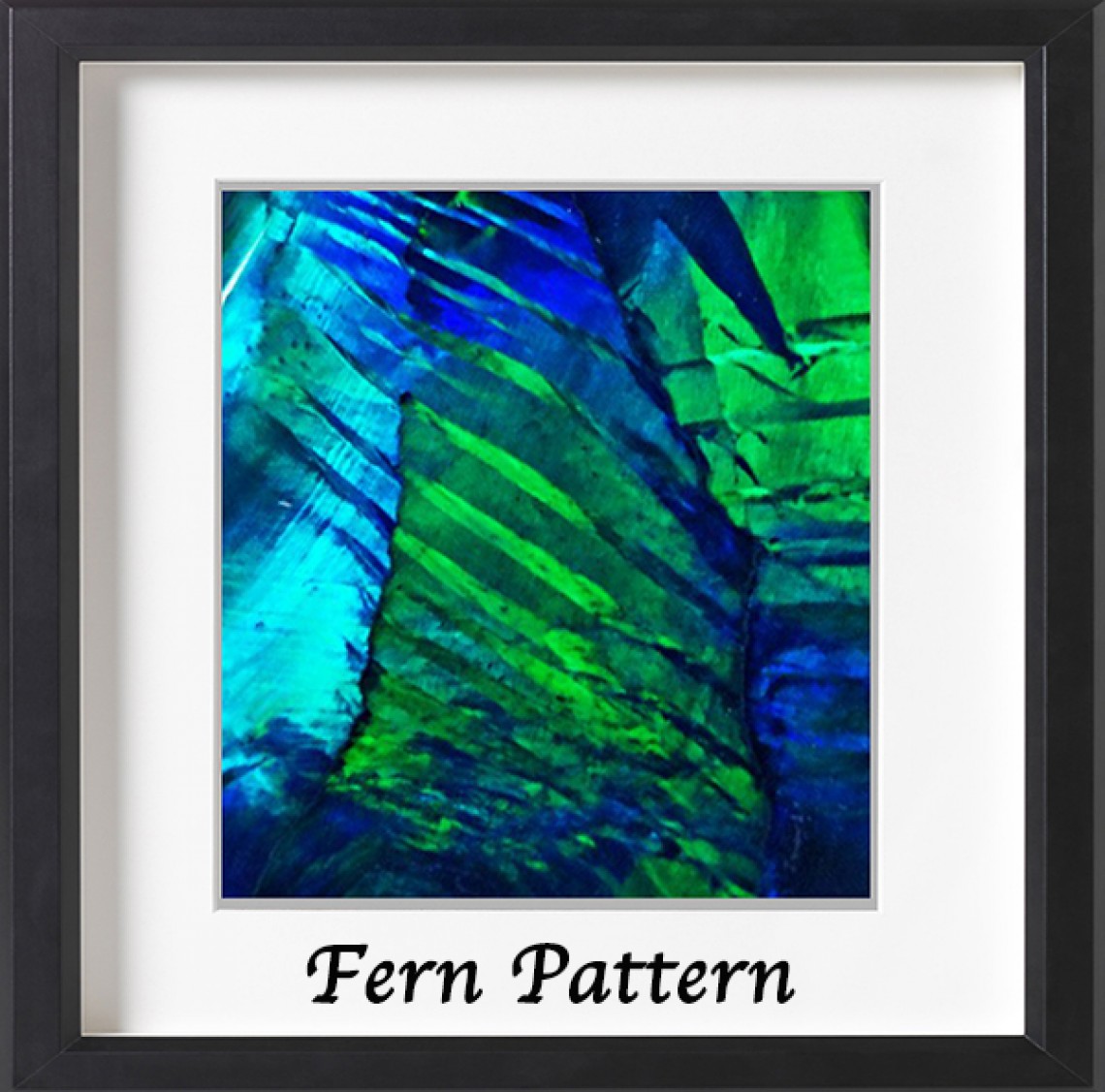
Feather Pattern
Similar pattern to peacock feathers. Feather pattern starting at central position radiating out as feathers

Honeycomb
This is one of the top sought after patterns for Ethiopian opals and the shape and size can vary greatly in the honeycomb pattern. It looks like a bee hive and mostly hexagonal shapes with seamless pattern

Mackerel Pattern
Beautiful rare rolling patterns as in mackerel fish that rolls and twists. Ribbon mackerel is a flowing connected pattern like mackerel

Galaxy Pattern
Similar pattern to images of constellations with small bright colour hues.

Neon Flash
This must have top brightest of B1 to be considered neon, so it is a rare flash pattern that covers the whole opal

Patchwork
As the name suggests it is multiple patterns in the one opal and are closely related patterns that resemble quilt designs

Pinfire
Small bright patterns of mostly different colors. It can also be the same color as small pin headed dots that have a columnar structure. The pattern is visible from all directions.

Puzzle Pattern
Used on Ethiopian opal to describe a mixture of patterns that complement each other to fit just like jigsaw puzzles

Ribbon Pattern
This formation is like rolls of ribbons formed on opal in different colours

Skin2skin
Skin to skin is the term used in Brazil where crystal opal is sold on top as the bottom and can be clear or with potch. In Australia it refers more to rough opal that displays predominately opal more than potch

Snake Skin
This description is used to describe pattern on Ethiopian opals like snake. Boulder opal can also have snake skin pattern but is rare

Jigsaw Pattern
Is used for top black opals with incredible colours with no systematic pattern.

Sheen Pattern
This is considered an over similar matching pattern of all equal colour with no distinct pattern

Spider Web
This pattern looks like spider webs and is white potch lines in the opal or can be colored veins also

Star Dust Pattern
Small patterns like galaxy of stars

Veined Patterns
Several veins of similar or different colours in horizontal or vertical lines, commonly used in boulder opal

NAMES RELATING TO COLOR OF THE OPAL, MORE THAN PATTERN
In the opal industry, you will hear these words spoken to describe an opal.
Multi fire
There are two or more colors that complement each other,
can be directional or flashy.

Pastel Red
Or Pastel Pink. This color can be soft red colour to pinkish
colours
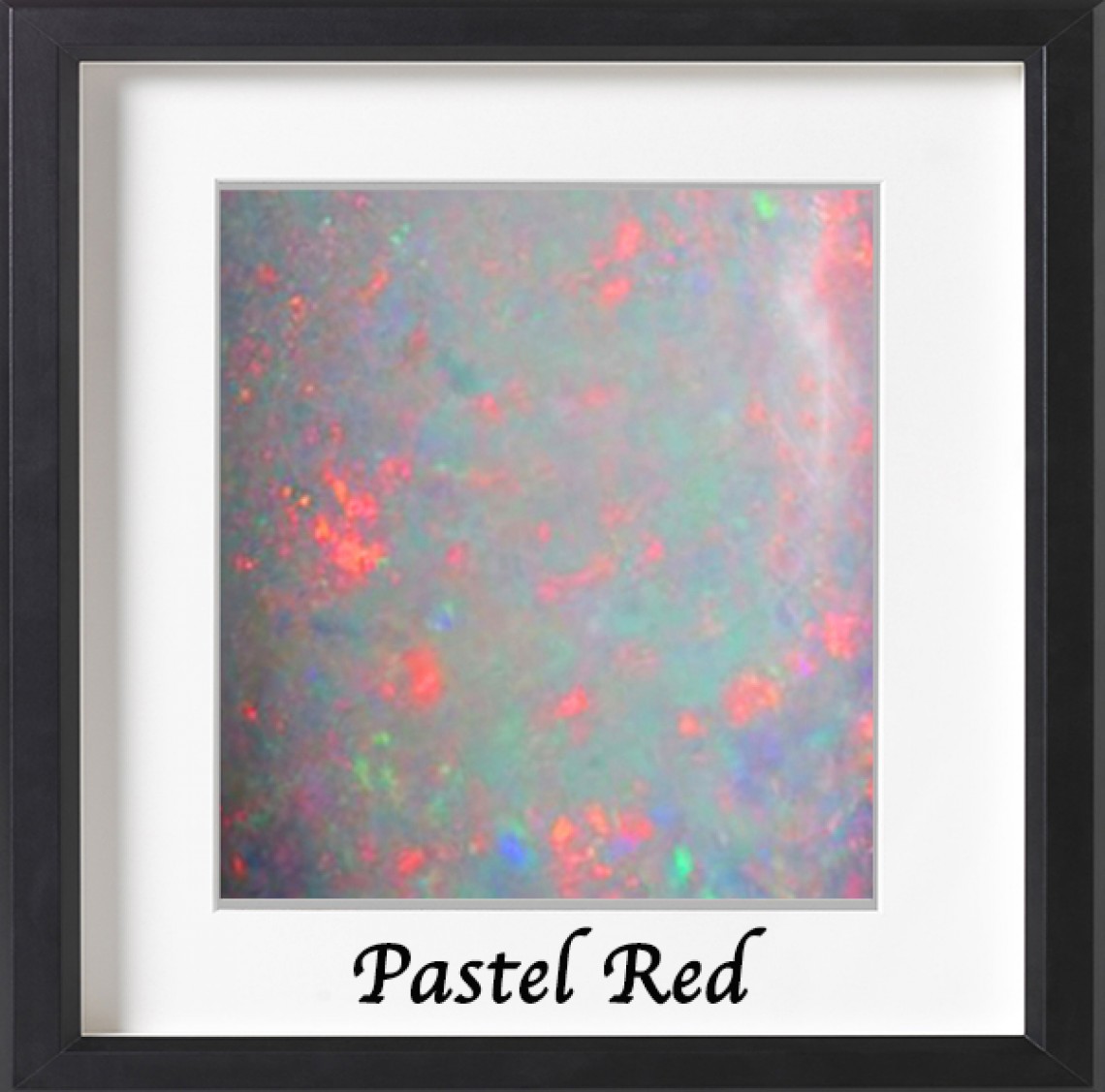
Picture Stone
Some stones have mixed formation and sometimes an image or landscape scenes can be seen in the opal
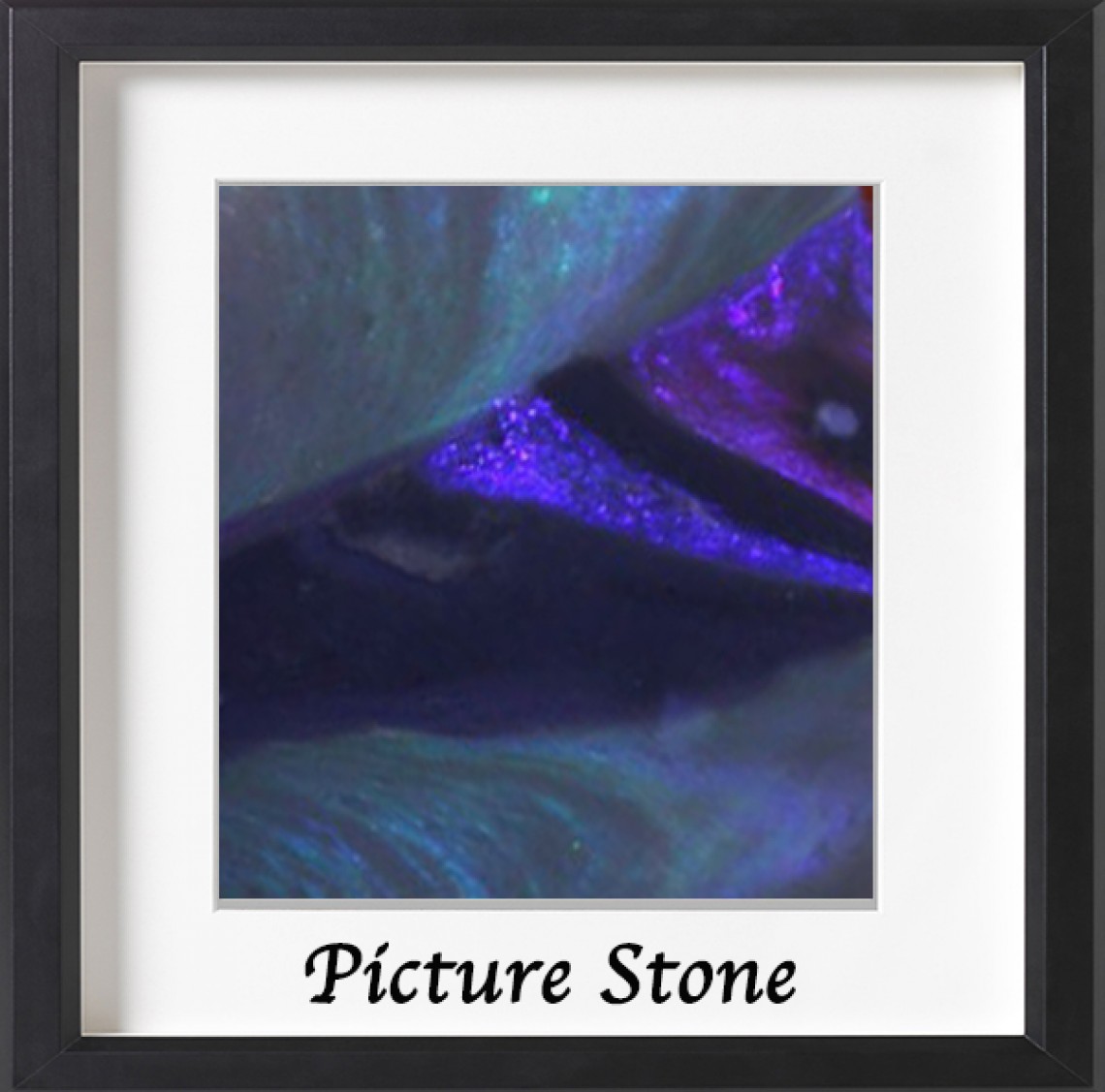
Double Sided Colour
Different colours on both sides

Black Crystal
These opals are formed mostly as pure crystal opal with no or little potch but have dark body tone N1. Most crystal opals have body tone N5 to N7 so it is rare to have dark body tone in crystal opals
Saturated
Many miners use this terminology, if the opal is full Color or pattern
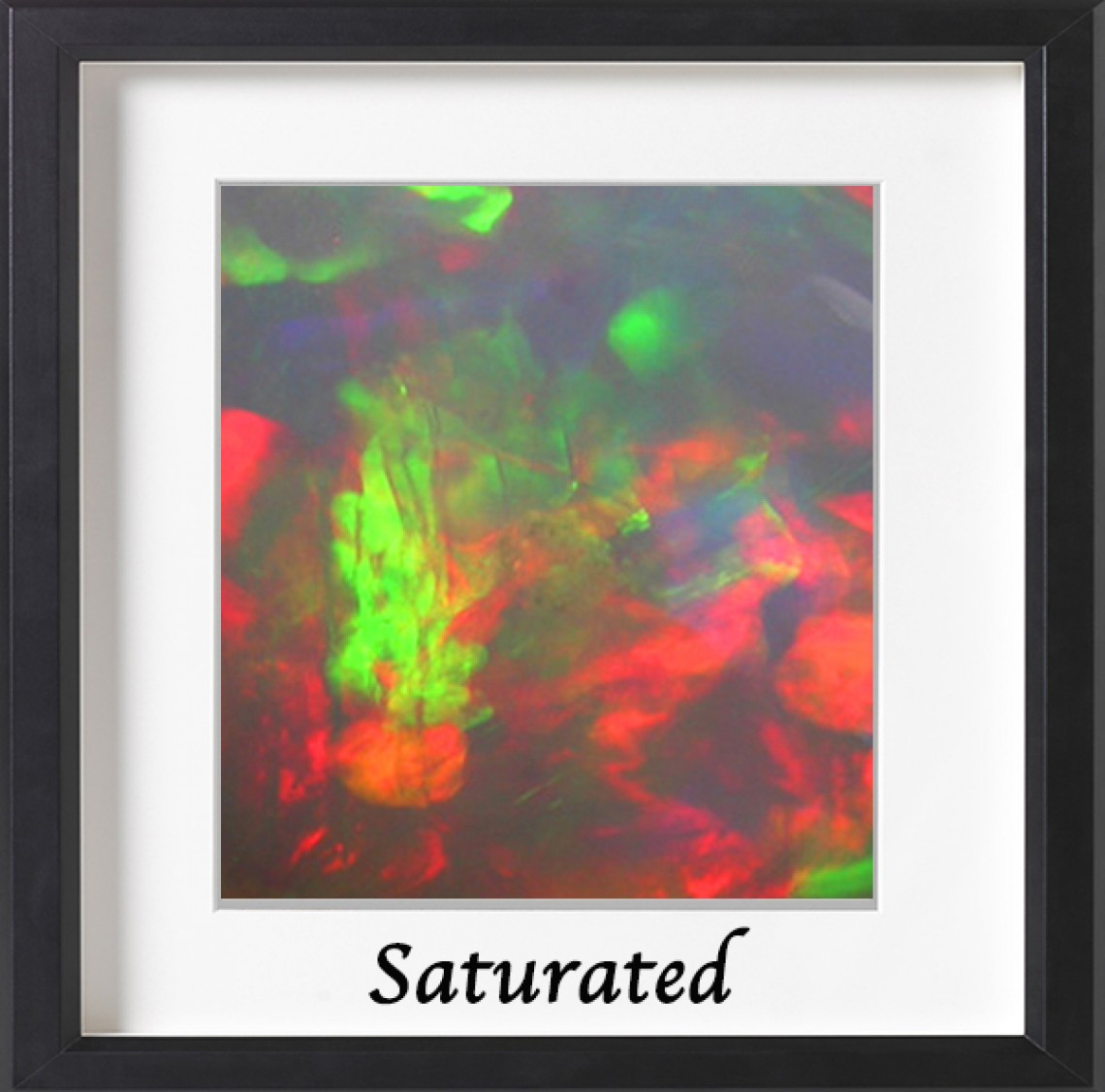
Dark Opal
This can refer to semi black opals from Lighting Ridge to dark colored Ethiopian opal. As Ethiopian opals have not been classified as black by gemmological associations.

Painted Lady
These opals are from Andamooka and are natural, they are not hand painted

Palette Opal
This has been used as colour but it actually refers to shape of the opal as in an artists palette
Smoked Black
This term describes Ethiopian crystal opal that has been treated, commonly known as smoked opal

Electric Blue
This formation describes colour brighter than normal sea blue.

Fingerprint Pattern
This pattern is very rare. We have only ever seen it on one Mexican Opal

Flash Fire
This is not a pattern but shows strong fire colours when the opal is moved.
Directional
This formation means the opal only faces strong fire when in a certain position, so these opals are ideal for pendants
Rolling Flash
This describes how the colors can be visible when you move the opal. A pattern would be Rolling broad flash pattern
Transparency
This relates to crystal opal and can be semi-transparent
Common Opal
Very basic with little colour or pattern, low grade.
Cherry Opal
Some Mexican opals have cherry colour and is creative description for this opal.
Lemon Opal
This opal displays lemon hues and is mostly found in crystal opals.
Milky opal
Milky Opal is coined for a milky white Common Opal and used mostly in South Australian opals.
Rainbow Opal
Precious Opal where the play of colour is seen in curved bands, like a rainbow.
Yowah and Koroit Opal Patterns

How Are Patterns Formed In Opals?
Sometimes potch lines can make unique patterns such as those discussed above. These potch lines can even divide two distinct colours or can make pattern in opal that has predominantly one colour. Opal is formed and composed of minute silica in sphere pattern and these are arranged in a 3-dimensional grid. It’s the spaces between the spheres and size that helps diffraction, and affect the colour and pattern so the size of the sphere is paramount for a good pattern.
What is Diffraction?
Diffraction and refraction both mean the bending of light. Diffraction is blending out of bands of different wave lengths of a beam of light or the scattering of light. The pattern’s shape does greatly affect the price of an opal in rarity and the top values are mostly Harlequin, mackerel, chaff, rolling cats eye.
SHOP FOR OPAL
Search the Opal Encyclopedia
Related Auctions
Related Articles
Australian Black Opal is one of the rarest gemstones on earth. It has every color of the rainbow on a black ground which makes the colors dance.
8th May 2018
Boulder Opal is one of the most undervalue opals valuable on the market. Learn more about this unique opal and browse the beautifully stones we have for sale.
29th May 2019
With a passion for opals, Wayne and Estella Sedawie established Opal Plus more that 14 years ago and have found the internet to be a valuable tool. It’s where most of the company’s international transactions take place.
17th Oct 2018
Latest Articles
An opal’s price comes down to a variety of factors, all of which we’ve broken down in this guide to opal grading and prices. Learn all about opal grading and the prices of each type of opal!
19th Jul 2023
Come on a journey and learn about the healing power of opals from our guest writer Vivien Schapera from Crystal Healing Techniques!
20th May 2023
The Flame (or Fire) Queen opal is the world’s most expensive opal, sold for the modern equivalent of $3 million dollars. Learn all about its history and qualities!
18th Feb 2023
Article Categories
All there is to know about Opals including Black Opals, Ethiopian Opals & Boulder Opal
15 Articles
Check out our fascinating information and articles on all things amazing in the Opal world
43 Articles
Opal Auctions sellers who are approved as opal Verified Sellers
4 Articles








